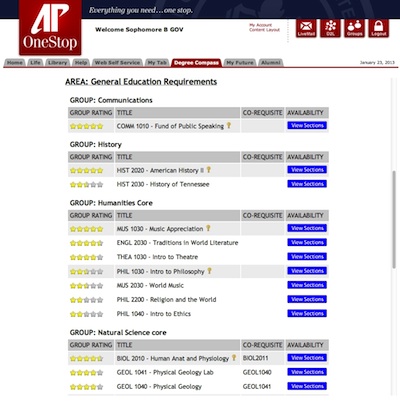Retention | News
Desire2Learn Acquires Course Recommendation Tech from Austin Peay State
- By Dian Schaffhauser
- 01/24/13
Education technology company Desire2Learn has acquired a program developed at a Tennessee university to help students select the optimal courses for academic success. Degree Compass is the brainchild of Tristan Denley, Austin Peay State University provost and vice president for academic and student affairs, who was seeking a business partner to commercialize the predictive analytics technology. The software helps students select courses, choose a major, and consider programs that are most suited to their academic talents and proven abilities. Denley created the Web-based course recommendation program with a million dollar grant from two funding sources--the Bill and Melinda Gates Foundation and Complete College America.
According to research done by Complete College America, the average student takes 20 percent more courses than required to fulfill their degree requirements.

Desire2Learn's new acquisition, Degree Compass, displays a suggested list of courses by analyzing a student's transcripts and other data against the data of hundreds of thousands of previous graduates. The software uses predictive analytics to make recommendations on classes in which the student will have the greatest chance of success. |
Degree Compass focuses on three basic areas:
- Providing students with academic advice during their time with the institution;
- Monitoring progress and offering ongoing personalized course and degree path recommendations; and
- Reducing time-to-degree with better course selection.
Jeff McDowell, vice president of market development for Desire2Learn, compared the software to the recommendation and star-ranking features of Netflix and Amazon. The program draws from several sources of data--what's contained in the student information system about the student, as well as his or her major and courses already taken--and performs a comparison to others who have followed the same academic journey to make suggestions for course selection. "The analytic algorithm that runs against all this data has been honed and perfected by Tristan to accurately use the historical data to basically create a map of a person, what they're good at, and then match that map to courses they could possibly take," he said.
"As students go into choosing their curriculum--which can be a daunting task for many--you're told what your core courses are. But you often have a selection of 200 to 300 electives to choose from. They can never be too sure if they're going in the right direction or aligning things to their competency," McDowell noted. "The one thing we know is when people are engaged in the course, engaged in school, and they do better and have higher grades, they tend to graduate more, and they tend to stay in school longer. With this technology, we can help students and learners optimize their learning paths upfront--meaning they've taken the right courses that line up with their competences and courses that will likely end up with higher marks. They're likely to graduate sooner and to stay in school as opposed to dropping out."
McDowell added that the Web service can be used by any educational institution--not just those already running Desire2Learn applications. "We would love all our customers to adopt it, obviously, because we think it's an excellent technology. But anybody in the world who has a learning institution can adopt this as a way to help out their students."
Unlike many solutions involving predictive analytics, this one doesn't require a statistician for success, said McDowell. "From what I'm told, the software takes about an hour or two to install. Then it gets integrated with the student portal, and away they go. The students interact with it directly."
The software has been in use at Austin Peay State for about a year, McDowell said. Two other institutions--the University of Memphis and the Nashville State Community College--have also implemented Degree Compass, and others are evaluating it. The company expects to release the rebranded program during spring 2013. And although pricing hasn't been set yet, "the return on investment is going to be incredibly compelling," McDowell said. "If this stops two students from dropping out, it's paid for."
About the Author
Dian Schaffhauser is a former senior contributing editor for 1105 Media's education publications THE Journal, Campus Technology and Spaces4Learning.

